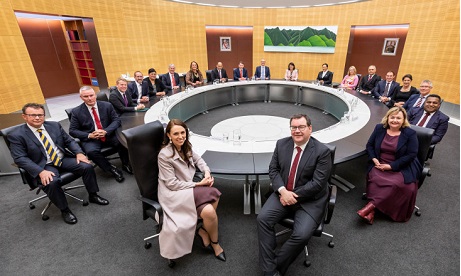Skyrocketing spending saw Cabinet Ministers (pictured) thinking of asking churches to help pay for the Royal Commission into historic abuse in care.
Official documents reveal the myriad of options the government also considered using artificial intelligence to analyse potentially highly sensitive documents. The aim was to cut staffing costs.
Instead of passing on the expenses associated with the inquiry, Cabinet chose to take away the inquiry’s ability to investigate modern care providers. It is estimated little money – $5 -15m, was saved from this decision as the majority of the inquiry’s work is already focused on historical abuse.
At the end of last year, the inquiry told the government it would need another two and a half years and a $226 million funding top-up to finish its investigation.
“This is substantially different to the government’s expectation when the Royal Commission was established,” the documents reveal.
Funding for the Royal Commission was split between two governments. It wasn’t fully funded when it was established in 2018. The previous government had allocated it just under $80m with the expectation it would need a further $60-80m in a few years.
According to the documents, the government was of the opinion that the increased spending resulted from the inquiry was taking an “overly legalistic approach.”
Officials told the government about limiting the inquiry’s scope. It “creates a significant risk that survivors may feel that that their experiences have not been properly taken into account and that the government is sweeping their experiences under the carpet,” they said.
Asking faith-based institutions to help cover the costs of the inquiry never made it to Cabinet because Internal Affairs Minister Jan Tinetti agreed the potential risk was too great.
“This creates a risk that victims and survivors may decide not to engage with the Royal Commission if they consider that it is being supported, or funded, by the institutions responsible for their abuse,” the documents say.
In April Cabinet agreed to remove the Royal Commission’s ability to investigate modern (post 1999) care practices. It also agreed to extend its deadline by five months.
This decision was made without consulting survivors.
According to the documents, officials told ministers that changing the inquiry to save money would be “politically and practically challenging.”
They also said amending its work part-way through the investigation could “be perceived as the government interfering in the Royal Commission’s work.”
Children’s Commissioner Andrew Becroft has previously written to the government earlier this month urging it to re-instate the inquiry’s power to investigate modern care practices or risk being handed an in-complete report.
Source
Additional readingNews category: New Zealand.




